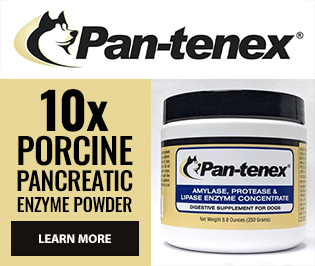Large breed dogs have powerful frames and big appetites, but they also come with unique digestive challenges. Among the most serious is gastric dilatation-volvulus (GDV), often referred to as bloat. While no supplement can guarantee prevention, good digestion plays a key role in minimizing the risk. Digestive enzymes may help large dogs break down their food more efficiently, reducing gas buildup and digestive strain.
Why Large Breed Dogs Face Higher Digestive Risks
Dogs over 70 pounds, especially deep-chested breeds like Great Danes, German Shepherds, and Standard Poodles, are more likely to experience poor digestion and related issues. These may include:
- Excessive gas and belching
- Loose or bulky stool
- Digestive upset after large meals
- Risk of stomach bloat due to gas retention
Slow digestion and incomplete nutrient absorption are often the root causes. Enzyme support can ease the digestive workload, making meals less taxing on the system. Learn more in How Digestive Enzymes Work to Improve Your Dog’s Health.
Supporting Digestion to Lower the Risk of Bloat
Bloat can occur when food and gas stretch the stomach, leading to pressure and potentially dangerous twisting of the stomach. This condition is life-threatening and requires emergency veterinary care. Though there is no single cause, several contributing factors include eating too fast, gulping air, overeating, and poor digestion.
Adding a high-potency enzyme powder like Pan-tenex may help break down food more effectively before it has a chance to ferment or produce excessive gas. Pan-tenex provides 10x the concentration of lipase, protease, and amylase compared to typical 6x or 8x products, making it more ideal for large breed dogs with bigger meals and larger digestive demands.
Meal Tips for Reducing Digestive Stress
- Feed multiple smaller meals instead of one large one
- Use slow-feeder bowls to slow down eating
- Soften kibble and allow enzyme powder to incubate 15 minutes before serving
- Encourage calm time after eating
- Avoid vigorous activity right before or after meals
Proper Enzyme Dosing for Large Dogs
Large dogs require more food and, as a result, a larger enzyme dose due to a larger meal size. With a product like Pan-tenex, the dose should be based on the size (# of cups) of each meal. You can find detailed recommendations on the Pan-tenex feeding guidelines page or in our article How Much Enzyme Powder Should I Use Per Cup of Dog Food?.
Keep in mind that dosing may vary depending on meal size, food type, and your specific enzyme product. Always read the instructions and consult your veterinarian before starting any new supplement.
Monitoring Digestive Changes
Some large dogs show improvement in stool consistency and appetite within a few days of starting enzyme support. Others may take up to a week. If you’re introducing enzymes for the first time, track progress using our Dog Enzyme Digestive Health Stool Tracker.
Final Thoughts
Large breed dogs require a thoughtful approach to digestion. Enzyme supplements can be a simple yet powerful way to reduce strain, encourage better nutrient absorption, and potentially minimize the gas buildup that can lead to bloat. For more guidance on how to safely support your dog’s gut health, explore our Help Articles or reach out with questions.

